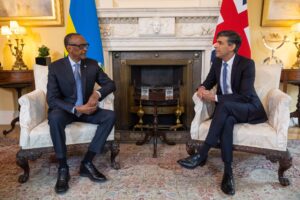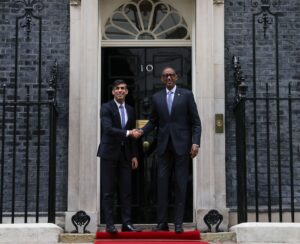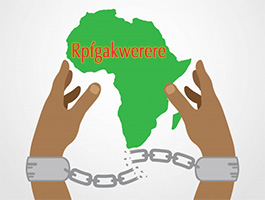By: Robert Patrick Fati Gakwerere
In a world where morality is often shaded in gray, the actions of some figures starkly illuminate the darkness within human nature. The tale of Criminal Paul Kagame, a dictator whose notoriety is matched only by his greed, is a chilling reminder of the depths to which humanity can sink in pursuit of personal gain. This is a man driven by avarice, but also a global system that enables, and sometimes rewards, such egregious acts.
In the evening of yesterday 8th March 2024, Criminal Paul Kagame abandoned the somber remembrance of the Tutsi Genocide in his enclave – Rwanda, to further his nefarious agenda. Rather than paying homage to the victims of one of the most horrific tragedies of the 20th century – Tutsi Genocide, Criminal Paul Kagame chose to jet off to the United Kingdom, a move that starkly reveals his priorities and the bloodthirsty nature lurking beneath his veneer of Dictatorship.

Like always, this journey was not one of diplomacy or statecraft, as one might expect of a national leader. Instead, his trip to the UK was driven by an ulterior motive: to finalize a human trafficking deal with his western masters. His meeting with the British Prime Minister, Rishi Sunak, at the iconic No. 10 Downing Street, was not just a routine diplomatic engagement. It was continuation of sinister negotiations aimed at sealing a deal that stands in stark contrast to the values of human rights and dignity.
The UK, in its bid to outsource the handling of asylum seekers, initially approached Ghana and Kenya with a proposition that was as controversial as it was substantial. This proposal, laden with financial incentives, sought to transfer the responsibility for asylum seekers to these nations, essentially exporting a domestic issue in exchange for financial compensation. However, both Ghana and Kenya, standing firm on principles and human rights, refused the offer. This refusal set the stage for Criminal Paul Kagame’s entry into the fray.
Criminal Paul Kagame, with his reputation for greed and avarice, saw an opportunity where others saw a moral quagmire. The deal, which can only be accurately described as human trafficking, found a willing accomplice in Criminal Paul Kagame. The financial rewards promised were enough to secure his cooperation, showcasing a flagrant disregard for the well-being and rights of the individuals affected.

This episode has raised profound questions about the state of global leadership and the international order. Criminal Paul Kagame’s actions, and the willingness of a developed nation, UK, to engage in such dealings, underscore a troubling reality. It reveals a world where financial considerations often outweigh moral imperatives, and where the most vulnerable are commodified in the geopolitical marketplace.
The involvement of Kagame, a figure already mired in controversy and accusations of tyranny, adds a layer of complexity to the international discourse on asylum and human rights. His readiness to partake in what essentially amounts to human trafficking, under the guise of a financial transaction, is a sobering reminder of the moral compromises that punctuate our modern political landscape.
As we grapple with political mafiarism between Kagame and his western masters, the need for a reevaluation of international norms and ethical standards has never been more apparent. The actions of individuals like Kagame, and the systems that enable them, must not only be condemned but also met with concerted efforts to prevent their recurrence. The dignity and rights of individuals must be at the forefront of international relations, not relegated to the shadows where figures like Criminal Paul Kagame operate. Only then can we hope to build a world that truly values and upholds the principles of justice and human decency.
 Africa Just another WordPress site
Africa Just another WordPress site


